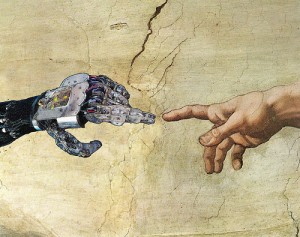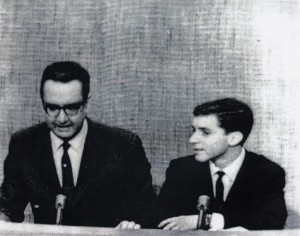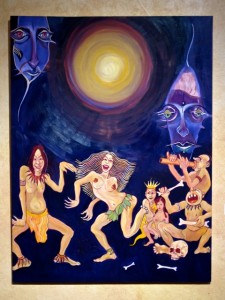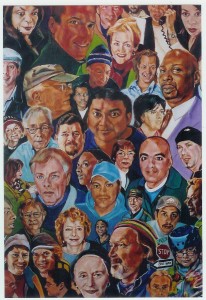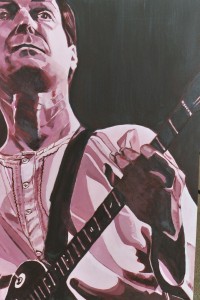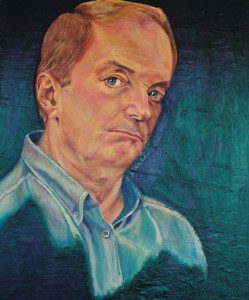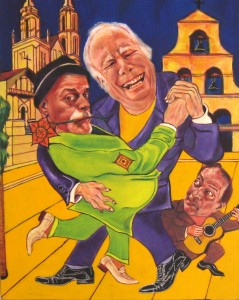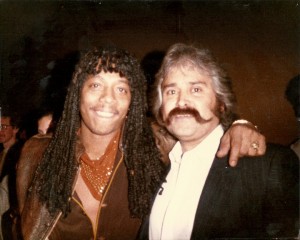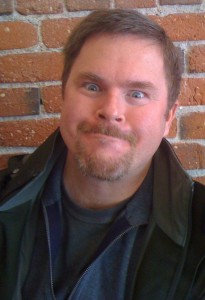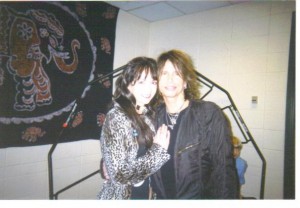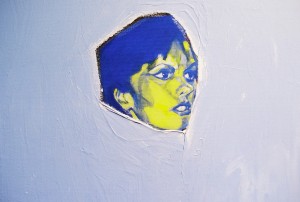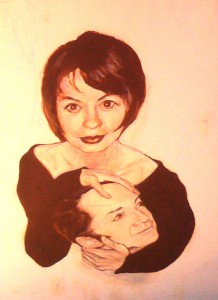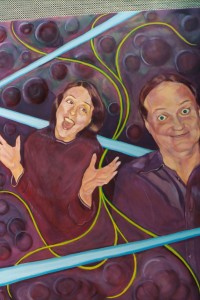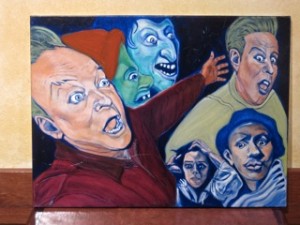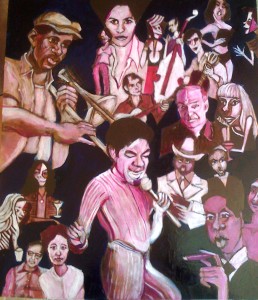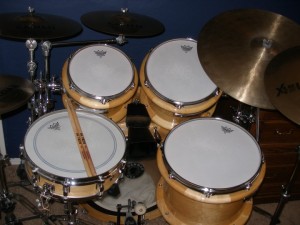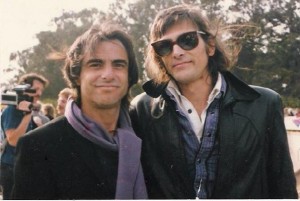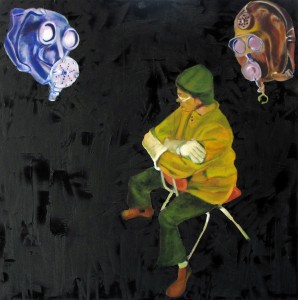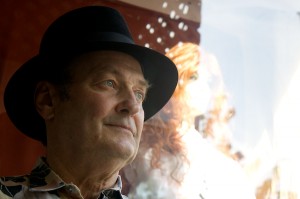18 July 2011
On 15 February 1965, a few months before Peter Albin and I started Big Brother and the Holding Company, Raymond Kurzweil played an instrument on the television game show called I’ve Got A Secret. What was the instrument? That was what the panelists had to discover but they could not.
Raymond, a high school student, had developed a sophisticated pattern-recognition software program that analyzed the works of classical composers, and then synthesized its own songs in similar styles. Everyone was more impressed by Raymond Kurzweil’s age than anything else. The person most impressed by what Kurzweil had done was Kurzweil himself, because he understood its implications.
Only humans can play music. A machine cannot create a work of art. Yet a machine had done just that. A computer built by a 17 year old had just taken the first step across the boundary between organic intelligence and artificial, created intelligence. Talk about a secret. No one could have guessed that one. Not even Steve Allen, the moderator of the show.
That was 46 years ago. Today, Ray Kurzweil thinks that computers will become more intelligent than humans in about 35 years. This will be a major evolutionary change for computers and for human beings.
Computer technology is evolving more right now in an hour than it did in its first entire 90 years from when Charles Babbage constructed his first “analytical engine” for the solving of computational and logical problems around 1900.
Computers are becoming faster faster. That is, their development rate is exponential instead of arithmetical. In two years, they develop four times as fast, and in four years they develop sixteen times as fast.
Yes, now computers can win at Jeopardy and chess and they can compose piano music and they have begun to drive our cars and tell us where to go, but this is the inception. This is the infancy of the computer.
When Ramond Kurzweil went on I’ve Got A Secret, the computer Univac was 25 feet by 50 feet in length, contained 5,600 tubes, 18,000 crytal diodes, and 300 relays. It utilized serial circuitry, 2.25 MHz bit rate, and had an internal storage capacity of 1,000 words, or 12,000 characters.
Now your iPhone is more sophisticated than Univac and you can hold it in your hand. That’s an impressive rate of evolution and the computer is only getting started.
Computers design other computers and it won’t be long before a computer designs a computer that can not only perform analytical tasks but can evolve into an intuitive, emotional being capable of creating real art and solving philosophical and behavioral problems, or at least wrestling with them, as well as we do.
Then what will happen? Copmputers will still compute and evolve faster faster and go somewhere we haven’t been and can’t even conceive, and will still build the next generation of computers. There seems to be no logical reason why this won’t happen, and also there seems to be no reason why we should fear such an eventuality.
Most of you probably don’t remember that in the 1950s people were afraid of computers. There was an apprehension that computers would take over, that they would dehumanize us. Has this happened? Everyone must answer this question for herself, but what I see in airports mainly is that EVERYONE has a computer, be it a laptop, an iPhone or some other device and no one is going to want to surrender that machine. People don’t fear computers now; they live inside them.
Computers will live inside of us. Computers are us. I can see the computer becoming smaller than a bacterium and then disappearing altogether from the physical realm and yet being far more powerful than that Univac or your present Mac. Or your present thousand Macs.
At this point the partition between organic and inorganic being will dissolve and a new species will appear. Do you find this unlikely or farfetched? What do you think the creeators of Univac would have made of Facebook with its algorhythms for facial recognition? A Facebook that we can receive with a device in the palm of our hand. Could they have predicted such an event?
This new species, this combination of computer and human is something that we cannot conceive, literally, as we are now. This is going to be the first major step in evolution since humanity evolved from the other primates and it is coming soon.
There is a word for this new break, this new step into the unknown, seemingly fantastical and yet quite logical. This word is the Singularity.
Raymond Kurzweil thinks about the Singularity. He has had quite a life in the last 46 years since Peter and I founded Big Brother. Probably his most mundane activity has been the invention and refinement of the synthesizers that bear his name. He had a meeting in 1982 with Stevie Wonder and he asked Stevie what was the biggest problem with music synthesizers.
The musician replied that synthesizers sounded artificial and not like real instruments, so Kurzweil created a new generation of music synthesizers capable of imitating a number of instruments, and in tests musicians were unable to discern the difference between the Kurzweil K250 on piano mode from a normal grand piano.
Kurzweil created and sold a software company while he was still in college and he built a print to speech reading machine for people like Stevie Wonder who bought the first one. And he also developed a speech to print device for doctors.
Remember John Tuturro in The Quiz Show? He was the preternaturally intelligent fellow who was a slob from Queens and he not only bested Mark Van Doren, the smooth college professor, but he exposed the whole payola behind the television show.
Raymond Kurzweil is a bit like the Tuturro character, unassuming and sharply intelligent. There is a DVD about him, The Singularity Is Near, that also features Tony Robbins and Alan Dershowitz
Technological progress happens exponentially, not arithmetically. Moore’s Law (the number of transistors you can put on a microchip doubles every two years) is quite reliable and steady.
Kurzweil created his own measure for such progress. The amount of computing power that you can buy for $ 1,000 also doubles every two years, both over the past time since 1900, vacuum tubes, radio, television, and into the future.
It is, of course, the future rolling out of this formula that is most startling. The take off is a slow curve and then there is a vertical climb into regions completely unknown and yet completely understandable, if you accept past performance as any kind of guide.
The power of computers is increasing and the cost of that increase is decreasing… exponentially in both cases.
Kurzweil believes, and it seems to be only common sense given what is happening now, that in thirty or forty years, and that’s taking a conservative view of the matter, that computers will have human intelligence, intuition emotions, brilliance, all of it. And more than all of it. Maybe there are other aspects here that we only dimly perceive now, but that computers will reach in their evolution.
Around 2045, thinks Raymond Kurzweil, with the exponential increase in computer power and the exponential decrease in the cost of that power, computers will possess something like a billion times the thinking power of all humans.
There is a Singularity Institute For Artificial Intelligence in, where else?, San Francisco. One of the ideas that float around in such an environment is immortality. After all, if the computer can be in you, and it can, then you can be in the computer. All that you think, feel, experience will be in that “machine,” and there is no reason for all of that thinking and feeling to cease merely because your actual body does.
There are several Singularitists who are working on the physical causes of aging too, and that is a whole fascinating area in itself. People like Aubrey De Grey see aging as a damage that can be repaired.
This biological concern with aging is, to me, nowhere near as interesting as the possiblity of entering all of your whole self into the computer, or if you will, being recorded, and thus becoming immortal.
Kurzweil means “short while” in Yiddish and German. it’s a good name for someone who posits that the merging of humans and computers will happen sooner than we all think.
Is this merging something to be afraid of? Remember that people were afraid of the computers when i was a teenager. Now we all love them, most of us anyway. The same will be true of future developments. I am sure of this. People were afraid of the horseless carriage in 1890. Now they’re probably more afraid of the horse.
There are many, many religious, philosophical, ethical questions that arise here and they will need to be confronted rather soon. (And it’s quite possible that computers will be doing the confronting.)
There is a kind of quality check called The Turing Test, where a computer should be able to pass as a human to someone who could not see the machine or the person. Let’s say a computer passes this test.
Is that machine then a person? Or a parrot?
If you scan your whole being, your conscious self, into a computer, then do you have, say, an afterlife as some think we do now? What country are you from? Who is your lover? What about life insurance?
Is anyone in charge? Who, for example, deserves to be immortal? is there a guest list, a gatekeeper, or is everyone invited?
One exciting aspect of this is that other beings on other planets may have reached this point already and may be visiting us. Tales of ghosts and apparitions over the centuries may be stories of scanned souls from elsewhere. “God” may have entered a machine somewhere in the ether, and, being particularly “good,” she may have helped us at certain intervals in our own history.
And then the sulphuric Beelzebub may be such a cyborg also. We cannot discount the possibility of a cybernetic malevolence, given the Manichean good and evil that exists elsewhere in our experience.
Raymond Kurzweil sees no fundamental difference between soul and silicon. Colleagues who declare that he is underestimating the complexity of the human brain are, in his view, underestimating the exponentiality of computer evolution.
People who deny, say, the theory of evolution are very often unable to imagine how much time has passed since the earth began to cool.
Almost countless revolvings of the earth around the sun have occurred during our journey to be who we are.
Unbelievably numerous “experiments” have been made to decide which way all life has developed. Many failures, many successes, many wrong and right turns have been made and accepted or discarded along the way. Unthinkably long periods of time have allowed for rest and creation, success and elimination of bad choices along the way.
Inability to imagine how long past periods have lasted goes with inability to imagine how far into the future we are going to travel.
Big Brother and the Holding Company travel a lot. Five years ago, five years ago, we had no Geographical Positioning Systems, no cell phones, no texting. Other people had these things, but we didn’t have them. Now we use all of these when we are traveling to a degree impossible to imagine when Peter and I founded the band in 1965.
Peter used to bring big, bulky maps on the road and we would pore over them trying to decide which was the best route. This was fun and we also had an overview of the country that we do not have now when we hold an iPhone with a GPS app in our hand, but it is so much easier to get around now.
Google is experimenting with computers that can drive cars. It’s only a matter of time.
The cell phone is now a computer, unimaginable a very short time ago.
Plus ça change, plus c’est la même chose. Change is the only unchangeable thing that we experience. Change is unchangeable. You can count on it.
The iPhone you have in your hand is one millionth the size of and one millionth the cost of and a thousand times more powerful than the computer that Raymond Kurzweil used at MIT when we were beginning to play as Big Brother and the Holding Company.
So, what if in forty years, the computer is one millionth the size, one millionth the cost and a thousand times more powerful than the iPhone today. Seems like a logical progression, right?
Use your imagination. Weld a new world.
This is an exciting time to be alive.
We are, as the cliché has ALWAYS gone, at the dawn of a completely new era, but this era seems to be more completely new than any other so far.
Well, something to think about anyway.
We are off to Tulsa, Bosnia and Italy. Of course I will be writing to you about that. See you soon.
Sam Andrew
Big Brother and the Holding Company
__________________________________________________________


